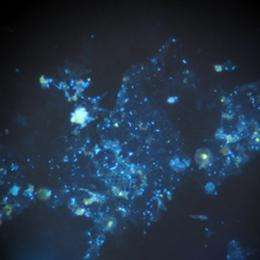Bacterial communication could affect Earth's climate

(PhysOrg.com) -- Woods Hole Oceanographic Institution (WHOI) scientists have discovered that bacterial communication could have a significant impact on the planet's climate.
In the ocean, bacteria coalesce on tiny particles of carbon-rich detritus sinking through the depths. WHOI marine biogeochemists Laura Hmelo, Benjamin Van Mooy, and Tracy Mincer found that these bacteria send out chemical signals to discern if other bacteria are in the neighborhood. If enough of their cohorts are nearby, then bacteria en masse commence secreting enzymes that break up the carbon-containing molecules within the particles into more digestible bits. It has been suggested that coordinated expression of enzymes is very advantageous for bacteria on sinking particles, and Hmelo and her colleagues have uncovered the first proof of this in the ocean.
"We don't often think about bacteria making group decisions, but that is exactly what our data suggest is happening," said Hmelo, now at the University of Washington.
The paper is published in the current online, "early view," issue of Environmental Microbiology Reports.
The source of carbon in the particles is atmospheric carbon dioxide, a heat-trapping greenhouse gas. Bacterial communication could lead to the release of carbon from the particles at shallower depths, rather than sinking to the ocean's depths. According to the WHOI scientists, this means that bacterial communication results in less carbon dioxide being drawn out of the air and transferred to the bottom of the ocean from where it cannot easily return to the atmosphere. This represents the first evidence that bacterial communication plays a crucial role in Earth's carbon cycle.
"So microscopic bacteria buffer the amount of carbon dioxide in the atmosphere through their 'conversations,' " Van Mooy said. "I think it's amazing that there are a near- infinite number of these conversations going on in the ocean right now, and they are affecting Earth's carbon cycle."
Provided by Woods Hole Oceanographic Institution
















